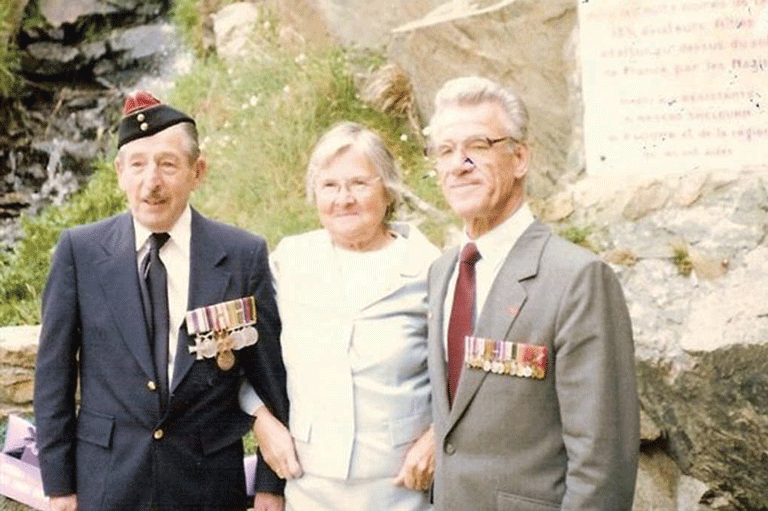
Former spies (left) Lucien Dumais and Raymond LaBrosse in 1984, with a woman who was a member of the French Resistance. [Courtesy of Tom Douglas]
A new one was urgently needed. MI9, the British military intelligence department, entrusted the task, code-named Operation Bonaparte, to a pair of French-Canadian volunteer spies.
Raymond LaBrosse, a sergeant in the Royal Canadian Corps of Signals, was the first Canadian spy recruited by MI9. He had entered France in early 1943 and worked with a French Resistance cell blowing up bridges and trains, conducting other mayhem, and helping Allied personnel trapped behind the lines to safety. When the cell was blown, LaBrosse was ordered to leave, but instead he guided 29 downed Allied airmen to safety in Spain.
Lucien Dumais, a sergeant-major with Les Fusiliers Mont-Royal captured in the Dieppe Raid in 1942, escaped from the train transporting him to a German prisoner of war camp and also made his way back to Britain via Spain.
They trained together that summer for Operation Bonaparte, learning how to select a beach for clandestine operations, how to identify it to London, how to use a BBC’s French-language program for communications, how to handle evacuation boats, and how to cover their tracks.
The pair landed in France in November and set to work, re-establishing safe houses and networks of resistance workers in Paris, where downed air crew and escaped PoWs were hidden until they could be safely moved, and in Brittany, where the “packages” were picked up on moonless nights from a secluded beach near Plouha, about 480 kilometres west of Paris.
A series of guides from the Resistance brought evaders to the railway station and bought tickets for the Paris-Brest overnight train, accompanied them on the train, often in the same car as German soldiers, and under the watchful eye of guards who could demand identity papers at any moment. At St. Brieuc in Brittany, new guides took the evaders to a safe house, then transported them after dark to Pluha, a very small town where strangers alighting from the train were sure to be noticed. Evaders were lodged in different houses to wait until conditions were ripe for rescue.
Nine times the first operation was called off; but conditions were right on the moonless night of Jan. 28-29, 1944. The OK came over the radio: “Bonjour tout le monde à la Maison d’Alphonse.”
While LaBrosse monitored the radio, Dumais and Resistance members led 17 evaders and two French citizens sought by the Germans through a ravine, down a cliff and over a shingle beach to boats that would carry them to a motor gunboat waiting offshore. They were about 1,500 metres from a German bunker armed with cannon, heavy machine guns and searchlights, with sentries and patrols to be avoided—or killed.
It took 12 minutes to transfer the evaders onto the boats and to take off six suitcases containing weapons and ammunition, a transmitter/receiver, Gauloise cigarettes, gin and whisky for presents and bribes and four million francs to run the network.
When Dumais arrived in Paris with the suitcase of money, he was stopped by police checking for black marketeers. Dumais picked out the youngest officer, told him the suitcase was full of money destined for the Resistance, and not to interfere if he wanted to avoid harm. Whether the officer was intimidated or a secret Resistance supporter, he let Dumais pass.
It was Bonaparte’s first successful operation. Between January and August 1944, Dumais and LaBrosse carried out nine evacuations saving the lives of 307 Allied personnel.
Advertisement





















